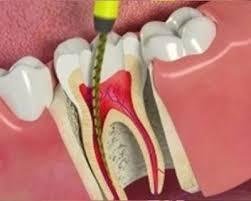Root canal treatment in Noida is a procedure for relieving an infected tooth. It removes infection, dries out tissue and cleans surrounding areas before covering it with a dental crown to restore appearance and functionality of the tooth.
As soon as the anesthesia wears off, patients must follow their dentist’s instructions regarding care for their tooth and gums. Any medications prescribed to them should also be taken accordingly.
Floss Dental Clinic
Root Canal Treatment may be your last hope in saving a badly infected tooth from extraction. RCT, more commonly known by its acronym “RCT,” involves extracting infected tissues from within your tooth before cleaning and sealing to protect remaining roots from further microbial invasion. Root Canal Therapy offers an affordable yet effective solution that will restore oral health while avoiding further problems with future dental health concerns.
Before beginning the procedure, your dentist will numb the area to ensure a comfortable experience. They then create an opening in the crown to expose the inner canals of your tooth for cleaning, disinfection, shaping and filling with an inert restorative material to protect and shield it. Finally, durable post endodontic filling and full coverage crown are placed as additional measures to secure and support it.
After receiving root canal treatment, it is essential to refrain from chewing on the affected tooth for at least seven days after treatment has completed. This will prevent recontamination of its canals and could save it from breaking prematurely before restoration is completed. Also, follow-up appointments should be scheduled so your progress can be tracked closely.
Floss Dental clinic is proud to offer numerous cosmetic dentistry services that can not only address any dental issues, but can also make your smile look better and boost confidence. Some procedures available at this clinic include dental implants, dentures, ceramic crowns and bridges and teeth whitening.
Dr. Anjana Bhargava
Root canal therapy (RCT), also referred to as endodontics or RCT, is an effective and long-lasting solution to prevent tooth loss and restore badly infected or damaged teeth. It involves opening the affected or decayed tooth, cleaning and disinfecting its canals thoroughly in order to avoid future infection, then filling and sealing it before finally placing a dental crown for protection and stability.
Beginning the process requires conducting an in-depth dental assessment on both the affected tooth and its roots, using imaging technologies like cone beam computed tomography (CBCT) scans or x-rays as necessary to examine its internal structures and detect any complications or potential problems. Blood tests may also be administered to assess overall health conditions as well as identify any underlying concerns.
Before beginning root canal treatment, a dentist anesthetizes the area using local anesthesia in order to numb it. Damaged pulp is then extracted, while canals are cleaned using disinfectant or antibacterial solutions and filled with biocompatible material, usually gutta-percha. A temporary filling may then be applied until permanent restoration work has been completed.
Dr. Suhrab Singh
Root canal treatment used to be one of the most painful procedures in dentistry; thanks to advances in anesthesia this is no longer true. Furthermore, treatment typically only requires two visits, meaning patients’ busy schedules won’t be disrupted during this process.
Root canal treatments typically begin by numbing the area surrounding a tooth. Your dentist then drills a hole into your tooth to extract damaged pulp, after which the canals are cleaned and disinfected with special tools and medications, before finally being filled with biocompatible material such as gutta percha and sealed for good measure.
After performing an effective root canal treatment, the dentist may suggest placing a crown to protect and stabilize the tooth. A crown will restore stability while protecting from reinfection while providing support to prevent it from becoming hollow or brittle over time.
Cost of root canal treatment varies based on your insurance coverage, so be sure to review it thoroughly in order to understand any deductibles, co-payments or pre-authorization requirements that might apply. It’s a good idea to consult a dental professional for more accurate costs estimates in your specific case, which will allow you to make the right decision for yourself.
Neo Dental Care
Root canal therapy is a dental process which entails cleansing and disinfecting the interior of a tooth to eliminate bacteria, while relieving any discomfort, swelling, or sensitivity caused by infected pulp tissue. Root canal treatment offers many advantages over tooth extraction such as saving money while also sparing you the expense and pain involved with extracting your tooth(s).
An RCT dentist will begin by applying local anesthetic, before creating an opening in the top of the tooth to access its pulp. He then removes damaged pulp, cleans out roots and fills in empty cavities with gutta percha before sealing them – potentially placing a crown afterwards to safeguard the tooth against further infection.
Root canal costs vary widely depending on factors like complexity of case, number of canals being treated and experience of endodontist. To achieve optimal results it’s essential that patients find a dentist with proven results and high skill levels.
Root canal procedures may cause discomfort after they have been performed; however, this should only last a short while and be relieved with over-the-counter painkillers. To help avoid repeated discomfort it is best to refrain from chewing on the affected tooth and visit your dentist regularly for checkups and examinations.



More Stories
Top PCD Pharma Franchise Companies in Bihar – Join the Best
Natural vs. Synthetic Estrogen Therapy: What’s Best for You?
Panathur: Perfect Your Smile with Teen Invisalign Today!